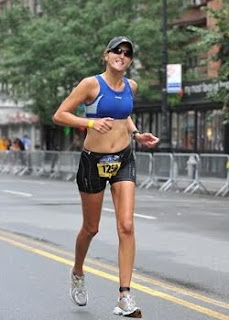My morning starts at 3:15.
I wake to the creaking of floorboards, followed by a buzzing alarm. A___ is already awake, creeping around the kitchen to make coffee.
“I was afraid you had slept in!” he whispers “Do you want anything for breakfast? Cereal? Toast?”
I sit up on the air-mattress, rubbing my bleary-eyes and trying to remind myself why I was on the living room floor of A___’s apartment.
You slept over. Your gear is in those bags by your feet. Today is race day. I then try to process his request. My mouth feels like it is filled with dryer lint.
“I’m going to eat my banana,” I decide, reaching for one of my bags. “Then I’ll figure it out.”
One banana, two slices of jam-covered toast, and three glasses of water later, A___ and I are heading through dark muggy streets toward the subway, our bags slapping against our backs. Stuffed into my bags are everything I will need for the race: sneakers, socks, biking shoes, water, Cliff nutrition bars, Shot Blocks, electrical tape, plastic bags, a race belt, my running bib, a baseball cap, a helmet, and a hand towel. In A___’s bag are his camera and an umbrella. I vaguely wonder whether he had any coffee before we left.
When we emerge from the subway station at 72nd street, a light rain has begun to fall. I head toward the hoards of athletes emerging from taxis and hurrying along sidewalks, A___ follows behind we make our way down to the transition area.
The transition area consists of thirty-odd rows arranged across an oblong field that and surrounded by a high metal fence. Each row is comprised of a long metal pole covered in square numbered stickers that correspond to each athlete’s race number. When I had dropped off my bike early Saturday afternoon, individual bicycles had been scattered amid the rows. Now, a growling generator beams light down onto a winking sea of silver, black, red, and yellow metal.
I make my way through the rows of bikes, racked merely inches away from one another, until I reach mine. Squatting in the dark, I spread my small, faded yellow hand towel on the grass to the left of my front tire. I set my sneakers together at the back of my towel, and my baseball cap and race belt next to them. At the front of the towel, I lay out my biking shoes and socks, along with a bottle of water.
The rain is harder now, drenching my hair and starting to drip into my eyes. I rip open a plastic shopping bag and lay it over all of my transition materials, tucking the edges around the towel. Then, I set my helmet upside-down on my handlebars, chin strap unhooked, and lay my sunglasses inside.
A___ and I walk over a mile to reach the swim start, and the rolling gray sky is just starting to lighten when we arrive. I step off of the concrete, into the wet soggy grass to take off my shoes and socks. Then I place them in a bag, inch my way up a hill, and stand in line with other athletes to load my bag into one of several trucks.
Finally, I am left holding nothing at all. My timing chip is secured around my ankle with its Velcro strap, and my goggles and cap are tucked into the shoulder strap of my swim top. With a tight throat, a churning stomach, and A___ serving as my personal photographer, I make my way down to the starting corrals.
The corrals are comprised of long metal gates lined up end-to-end to form a long chute parallel to the Hudson River. A single section of fence is set perpendicularly to block off segments of this chute, and each segment is marked with a sign indicating certain age group and color.
The race is organized by dividing male and female competitors into 5-year age groups. Each age group is then split in half, and each half is assigned to a particular color. My color was white, meaning that I am wearing a white swimming cap and am standing with other 25-29 year-old white-capped women in our designated corral. Meanwhile, A___ stands on the other side of the corral fence, snapping pictures, juggling his umbrella, and assuring me that I am going to be great.
Twenty minutes before the race is scheduled to start, a 20-minute delay is announced, due to a car that has flipped over on the highway where we are about to bike. At this point, A___ finally says good-bye in order to head back down to the swim exit, where he will set up to take pictures when I emerge from the Hudson River. After he leaves, and I look out onto the churning river, wondering,
If the roads are slippery enough to flip a car, what’s going to happen when I ride over them on a wobbly little bike?
Suddenly, I hear a familiar voice.
“Allison? Allison?”
I turn away from the river, and there is R____, virtually standing next to me except for the metal corral fence separating us.
“R___!” I throw my arms around his neck and give him an awkward, wet hug. As it turned out, he and my parents had arrived in time to find a spot with a clear view of the swim start. Then, when they heard the announcement about the race delay, R___ decided to plunge into the sea of athletes and spectators around the corrals to see if he could find me. In spite of the crowd, A___ had run into R___ and led him to my corral! It was a small miracle!
 Animal, Vegetable, Miracle: A Year of Food Life by Barbara Kingsolver
Animal, Vegetable, Miracle: A Year of Food Life by Barbara Kingsolver











